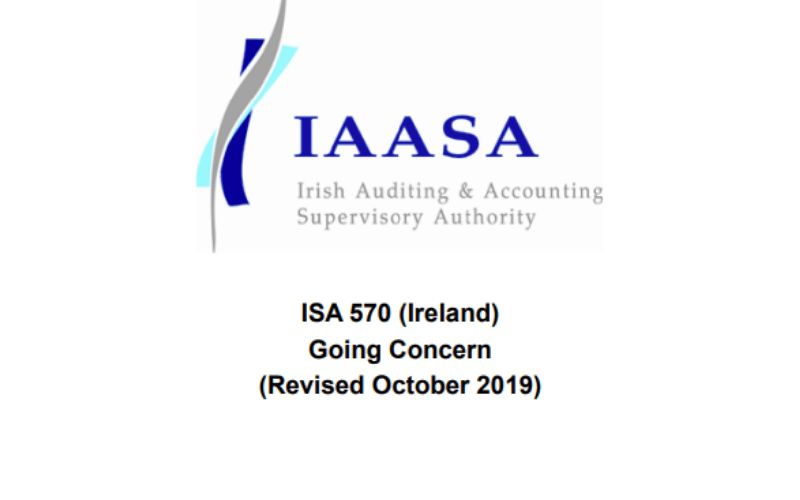
by John McCarthy Consulting Ltd. | Aug 10, 2022 | Blog, News
The Companies (Corporate Enforcement Authority) Act 2021 was commenced on 6 July 2022, apart from Section 35. One of the principal aims of the act was to allow for the set up of the Corporate Enforcement Authority that replaces the Office of the Director of Corporate Enforcement (ODCE).
Section 35 of the Companies (Corporate Enforcement Authority) Act 2021 amends the Companies Act 2014 by inserting a new section 888A.
This section requires a director to include their personal public service number (PPSN) in an application to:
- incorporate a company;
- file an annual return (B1) made by a company of which he or she is a director; and
- file a notice of change of directors or secretaries (B10) made by a company of which he or she is a director.
The Registrar of Companies shall determine the Director’s identity information to be provided where the director has no PPSN. Non-compliance will constitute a Category 4 offence.
It is expected that this section will commence in early 2023.
Are your AML Policies Controls & Procedures up to date?
We have just released our latest Anti-Money Laundering Policies Controls & Procedures Manual (March 2022) – View the Table of Contents click here.
We have also just released an updated AML webinar (March 2022) available here, which accompanies the AML Manual. It explains the current legal AML reporting position for accountancy firms.
To ensure your letters of engagement and similar templates are up to date visit our site here where immediate downloads are available in Word format. A bulk discount is available for orders of five or more items if bought together.
For our latest Audit Quality Control Manual (October 2021) (implementing the latest Irish Audit & Accounting Supervisory Authority standards including ISQC1 on audit quality control) click here. View the Table of Contents here.

by John McCarthy Consulting Ltd. | Apr 14, 2022 | Blog, News
A significant legislative change made five years ago will only impact affected companies this year. The amendment made by the Companies (Accounting) Act 2017 amended section 1274 dealing with unlimited companies (known as a ULCs).
‘Designated ULCs’ lose accounts filing exemption
Among other changes, certain types of ULC (known as ‘designated ULCs’) are required to file their accounts with the CRO (including group accounts where applicable) for the first time. While most changes in the law came into effect from 1 January 2017, this one was delayed until accounting periods commencing 1 January 2022.
The amended Section 1274 Companies Act, 2014 broadly states that for accounting periods commencing on or after 1 January 2022, a ULC that has been a holding company of an undertaking which was at that time limited must file financial statements along with their annual return for accounting periods commencing on or after 1 January 2022.
This applies across the board regardless of the size of the group as section 1274 does not have any exclusion clause that says the section disapplies sections 347/348 making the filing of annual returns/accounts compulsory.
ULCs may qualify for audit exemption
In a related point Section 1230 Companies Act, 2014 allows such designated groups, where they are private ULCs (provided they satisfy the ‘small’ company criteria) to claim audit exemption (assuming all the other criteria are satisfied – annual returns filed on time, no 10% shareholder objections etc., their constitution permits audit exemption etc. ) because the Table disapplying certain sections of the Companies Act, 2014 for ULCs does not disapply the audit exemption and ‘small’ company criteria for ULCs contained in Parts 1-14 of the Companies Act, 2014.
Filing Exemption Remains for non-designated ULCs
So-called ‘non designated’ ULCs under Section 1274, that do not have any limited liability subsidiaries and whose direct and indirect shareholders do not comprise solely of limited liability undertakings will continue to be exempt from the requirement to file their financial statements.
In other words where a company is a ‘pure’ unlimited company (i.e. there is no ultimate protection of limited liability in the group structure), it will still be possible to avail of an exemption from filing financial statements.
However, they will need to file an auditor’s report attached to the Annual Return which confirms that the auditors have audited the financial statements of the company for the relevant financial year in accordance with sections 336 and 391.
Are your AML Policies Controls & Procedures up to date?
We have just released our latest Anti-Money Laundering Policies Controls & Procedures Manual (March 2022) – View the Table of Contents click here.
We have also just released an updated AML webinar (March 2022) available here, which accompanies the AML Manual. It explains the current legal AML reporting position for accountancy firms.
To ensure your letters of engagement and similar templates are up to date visit our site here where immediate downloads are available in Word format. A bulk discount is available for orders of five or more items if bought together.
For our latest Audit Quality Control Manual (October 2021) (implementing the latest Irish Audit & Accounting Supervisory Authority standards including ISQC1 on audit quality control) click here. View the Table of Contents here.

by John McCarthy Consulting Ltd. | Oct 29, 2019 | Blog, News
The UK audit regulator has revealed that among the key reasons for launching an investigation into the collapse of Thomas Cook were ‘issues around going concern and goodwill impairment.’
As if on cue, the Irish audit regulator IAASA, has just issued (October 2019) a revision to the audit standard on Going Concern, called ISA 570. This comes into effect for audits of accounting periods that commence on or after 15 December 2019.
The revised standard on Going Concern in Ireland will trigger additional audit work and evidence gathering for auditors in the following areas:
- greater work on the part of the auditor to more robustly challenge management’s assessment of going concern;
- thoroughly test the adequacy of the supporting evidence;
- evaluate the risk of management bias;
- make greater use of the viability statement;
- improved transparency with a new reporting requirement for the auditor of public companies, listed and large private companies to provide a clear, positive conclusion on whether management’s assessment is appropriate;
- to set out the work they have done in this respect; and
- a stand back requirement to consider all of the evidence obtained, whether corroborative or contradictory, when the auditor draws their conclusions on going concern.
This standard arrives at a very important time, in the midst of serious questions being raised about recent corporate collapses in the UK such as the travel company Thomas Cook, BHS and Carillion.
The ongoing FRC investigation into EY’s audit of the financial statements of Thomas Cook Group has raised questions about the sufficiency of the challenge auditors applied to management’s assumptions about going concern and goodwill, and the sufficiency of the audit evidence to support the work that was done.
Answering questions from the UK Business, Energy and Industrial Strategy (BEIS) committee, the FRC director of enforcement, Elizabeth Barrett, told UK MPs that there was sufficient information about potential issues within the audit to merit an investigation.
When asked to specify those concerns, Barrett replied ‘broadly speaking, in particular issues around going concern and goodwill impairment.’
While Thomas Cook had reported impairments to goodwill in 2011, there had been no further reporting on this until 2019, when £1.1bn was written down.
The UK audit regulator (FRC) has also amended the audit standards on going concern and goodwill impairment in recent times.
Support material
For more on best practice in Audit , see our up to date webinar here.

by John McCarthy Consulting Ltd. | Oct 14, 2019 | Blog
In a rare speech, Sir Donald Brydon, chair of the Future of Audit in the UK, told a packed conference room that he is a little troubled at the current mood that ‘reaches for a shotgun aimed at auditors every time there is a corporate problem’.
Speaking at the first ICAEW Audit & Assurance Faculty Audit Conference on 4 October 2019, Brydon, former chair of the London Stock Exchange, stressed the importance of balancing the responsibility and the blame for company failures between auditors, audit committees and company boards.
Ultimately, Brydon said it was directors and their actions, not auditors, that should be to blame for recent audit failures. He did not name any names but recent failures like Carillion and BHS have likely triggered this response along with other reviews.
The Brydon Future of Audit review, an independent UK government review, received 120 responses – a total of 2,500 pages of comment, while over 100 meetings and roundtables were also held to gather views.
Brydon plans to report back to the UK government on his recommendations by the end of December 2019 and all the consultation responses will be published.
In his speech, Brydon revealed that the review would seek ‘to consider how audit can become a more informative process and product whilst not losing its compliance aspect’.
Brydon insisted that it was not his intention to ‘redesign Western capitalism’, adding that, it was ‘important to note that many people and organisations have expressed their frustrations with what they see as, essentially, a narrow, backward looking and increasingly rules-obsessed approach to audit’.
He said that one of the respondents to the Review ‘compared the audit to a high jump, in which auditors have little incentive to do more than the minimum required to “clear the bar”. I repeat that there is a hunger for audit to be informative and not just evidencing compliance.’
But what does this mean for the future of Irish audit practices? Much of the audit standards that are implemented in the UK, soon follow suit here.
As they say, watch this space.
For more on best practice in Audit , see our up-to-date webinar here.
Also watch out for our new fully updated AML Policies & Procedures Manual June 2019 edition – includes the latest requirements of the Criminal Justice (Money Laundering and Terrorist Financing) Acts, 2010 to 2018 which came into force on 26 November 2018
For on-demand webinars on AML and developments in Investment Property Accounting, FRS 105 – part of the Company Law Update, Common Errors in FRS 102 Accounting, visit our online webinar training website. Once viewing is completed customers will receive a CPD Certificate confirming their learning.
by John McCarthy Consulting Ltd. | Mar 5, 2019 | Blog, News

In spite of efforts to make UK registered companies disclose their ownership through the people with significant control (PSC) register, thousands of companies don’t comply with the rules brought in to counter fraud and money laundering.
According to a 2018 Freedom of Information request to Companies House by Fortytwo Data (now Napier), over 57,000 UK businesses are not yet compliant with new regulations.
Similar requirements are in the process of being introduced in Ireland, called the Beneficial Ownership Register to be maintained by the Companies Registration Office (CRO), as part of the enforcement of the EU Fourth AML Directive.
It is a criminal offence not to follow the PSC/Beneficial Ownership requirements, with potential sanctions including fines for the companies involved and up to two years in prison for the culpable individuals.
PSCs/Beneficial Owners, are natural persons who own directly or indirectly at least 25% of a company’s shares or control at least 25% of its voting rights, or have control over appointments to the board of directors.
The PSC/Beneficial Ownership Registers are designed to reduce the ability of money launderers to hide and funnel their ill-gotten gains, using apparently legitimate corporate structures.
For more up to date information on developments in company law and anti-money laundering, visit the new online webinar training section of our website. Once viewing is completed customers will receive a CPD Certificate confirming their learning.










